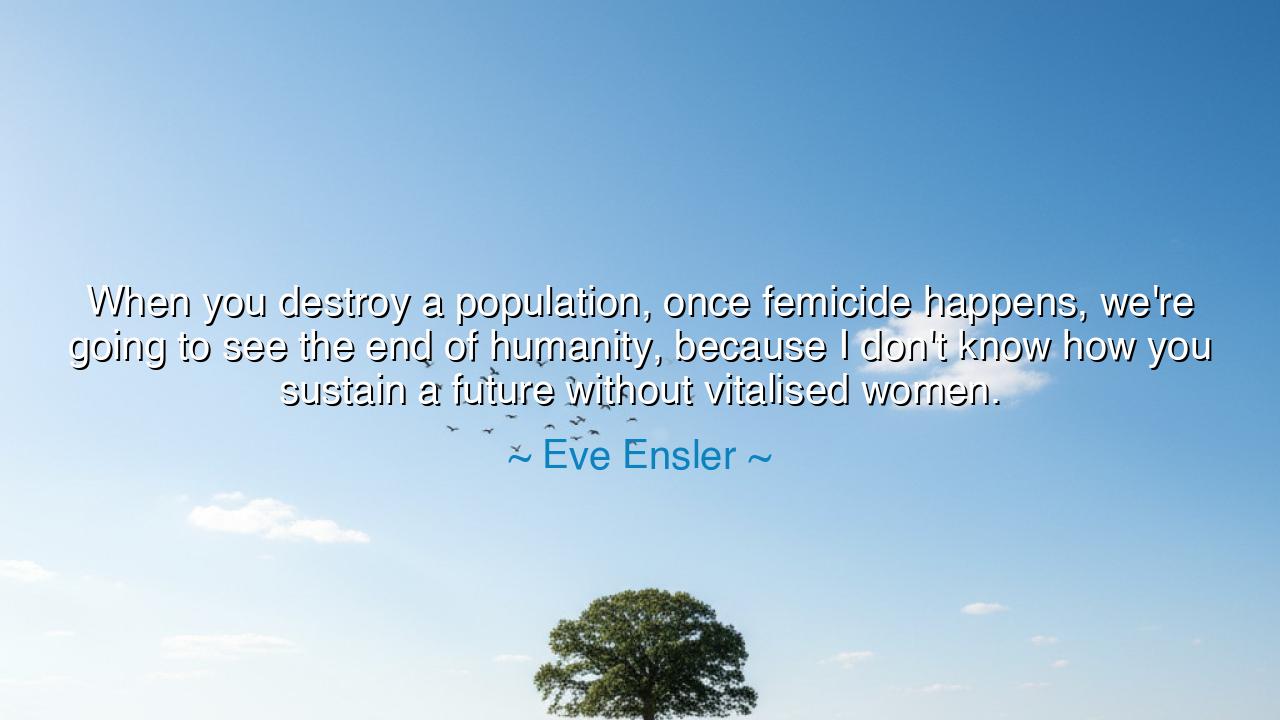
When you destroy a population, once femicide happens, we're going
When you destroy a population, once femicide happens, we're going to see the end of humanity, because I don't know how you sustain a future without vitalised women.






"When you destroy a population, once femicide happens, we're going to see the end of humanity, because I don't know how you sustain a future without vitalised women." These words spoken by Eve Ensler strike at the very core of humanity’s survival and future. Ensler speaks to the devastating impact of violence against women, particularly femicide, and the existential threat it poses not just to individual societies, but to the continuation of humanity itself. Her statement calls attention to the vital role that women play in the sustenance of life—biologically, emotionally, and socially—and how the destruction of women, through acts of violence and oppression, threatens the very fabric of the future.
In the ancient world, the role of women was recognized as foundational to the survival of communities. The Greeks, though often placing women in subservient roles within their society, still acknowledged their divine connection to life. The goddess Demeter, for instance, was revered as the protector of the harvest, ensuring that the earth would continue to nourish and sustain the people. In ancient Egypt, women were worshipped as goddesses of fertility, as symbols of life and creation. The loss of such figures—whether through violence or neglect—was understood as a loss of the life force itself. Ensler’s statement builds upon this ancient understanding, asserting that when women are destroyed, so too is the very life force that drives the future of humanity.
Throughout history, the oppression of women has often been linked to the downfall of civilizations. One of the most poignant examples is the fall of Rome, where the role of women in Roman society, though significant, was severely constrained. As the empire began to crumble, some historians point to the decline in the rights of women as a symbolic indicator of its societal collapse. The Romans knew that a healthy, thriving society depended on the well-being of its women, who were responsible not only for raising the next generation but for maintaining the cultural and social fabric of the empire. When women were marginalized, when their voices were silenced, and when their lives were disregarded, the empire began to unravel. Ensler’s words serve as a modern echo of this ancient truth: the destruction of women—through violence or systemic oppression—spells disaster for any society, because it is women who carry forward the future of humanity.
Consider the story of the suffragettes, who fought for the right to vote and to have a voice in shaping society. Women like Emmeline Pankhurst and Susan B. Anthony fought not only for political equality but for the right to participate in the creation of their society’s future. Their struggles were not just about securing individual rights but about ensuring that the life force of society—represented through the voices of women—was not lost to oppression. Their victory was a testament to the resilience of women and the unfathomable loss that would have been incurred had their efforts failed. Ensler’s words are a reminder that when the voices of women are silenced, society loses its future, its hope, and its potential for renewal.
The lesson Ensler offers us is one of urgency and reflection. When women are disempowered, when they are denied their rights, or when their lives are taken violently, the future of humanity is compromised. Femicide, as Ensler points out, is not just a tragedy for the women who suffer from it but for the society that allows it to happen. It is an attack on the very lifeblood of humanity. Women are not just the bearers of children, but the keepers of wisdom, culture, and nurturance. When we fail to protect them, when we fail to respect them, we risk the very collapse of our communities. Ensler’s call is not just for the protection of women but for the preservation of humanity itself.
In our own time, we must reflect on how we treat women—how we protect them from violence, how we ensure their equal participation in all aspects of life, and how we cultivate a society that values them not as objects, but as the lifeblood of human civilization. This is not merely a matter of justice or human rights; it is a matter of survival. Just as the ancient civilizations recognized the vital role of women, so too must we. The empowerment of women is the key to the flourishing of all, and their destruction—through violence, discrimination, or neglect—signals the end of progress.
Let us, then, commit ourselves to protecting and uplifting women, for in doing so, we ensure that the future of humanity remains vitalized and hopeful. Let us recognize the immense power that resides in every woman, and let us work to honor and celebrate that power. As Eve Ensler reminds us, when we destroy the lives of women, we destroy the foundation of our future. The preservation of women’s dignity, freedom, and rights is not just an act of moral courage, but a necessary step for the preservation of humanity itself.






AAdministratorAdministrator
Welcome, honored guests. Please leave a comment, we will respond soon